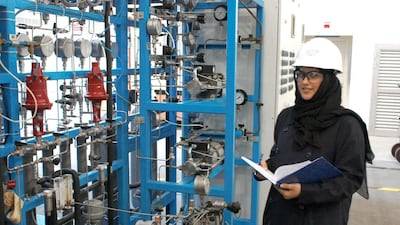More women are venturing into the energy sector, but cultural challenges remain a hurdle for Emirati women.
For the first time, the Abu Dhabi International Petroleum Exhibition & Conference (Adipec) will present the Adipec 2015 Oil & Gas Woman of the Year award to recognise individuals in the energy workforce.
Reem Al Anbari, chief financial officer at Borouge, which is part-owned by Adnoc, recalls her start in the hydrocarbon sector more than 20 years ago. Being the only woman at the company, it was a challenge because she had never interacted with the opposite sex.
“When you study at school, it’s separate so there’s no real interaction with men,” she said. “It’s very difficult as a woman to speak up in our culture.”
Figures from Shell Global show that 29 per cent of its employees in supervisory/professional positions are women, and the proportion of women in its senior leadership positions has nearly doubled over the past decade – to 18 per cent last year, from 9.9 per cent in 2005. Similarly, about 28 per cent of ExxonMobil’s global workforce are women, and last year, 40 per cent of management and professional new hires were women, significantly higher than the percentage of women in its overall employee population.
There is little available data for how many women work in the energy sector in the UAE. But at Abu Dhabi-based Dolphin Energy the female workforce is about 40 per cent of the total.
Ms Al Anbari said that traveling outside the UAE helped, but the words of a female mentor were what she leaned on most. The woman told Ms Al Anbari that if she wanted to be something, she had to push herself. “Every time there is any challenge in any meeting, I remember that message: ‘Don’t be shy, say it. You have to believe in yourself’,” she said.
“I think many women just aren’t comfortable working in this [male-dominated] environment,” said Mariam Al Badr, director of corporate communications at Dolphin Energy.
“The household makes it more difficult for you to be away from your family for extended periods of time.”
This is particularly true for female engineers, as a great deal of work is usually completed in the field, which is often far from civilisation.
“In our culture, it’s very hard for women to live away from their families,” said Amna Al Maqtari, a process engineer for Takreer Research Centre.
“Some families are OK with it, and I know a few women already based in the field,” she said, but added that some of those same women faced difficulties when they wanted to get married. “Some have an advantage if they get married in those areas,” she said.
Ms Al Maqtari said that men, such as fresh graduates from her alma mater, the Petroleum Institute, were immediately placed in the field. But for the female engineering graduates, onsite training is typically limited to one or two months at a time as opposed to a man who will complete a full year in the field. “In the research centre, mostly women are hired to avoid having to base them in the field,” she said.
When asked if she felt this placed her at a disadvantage compared with her male colleagues, she admitted there was a small gap in the technical expertise. Ms Al Maqtari said she would be interested in spending more time in those remote locations to gain more technical knowledge, if she had everything on her side – such as cultural support.
“For the technical experience I’d like to be in the field, but I wouldn’t want to be there my whole life,” she said.
Ms Al Maqtari said that working in remote locations was challenging for another reason – many of the field sites do not have female amenities, such as living areas. She said that some companies were beginning to offer accommodation for women at certain fields. “It’s starting to change and in 10-20 years, maybe it will be normal [to see women at these remote sites],” she said.
The Adipec awards gala dinner will take place on November 9.
lgraves@thenational.ae
Follow The National's Business section on Twitter

